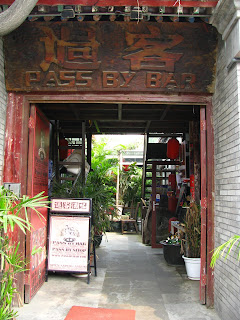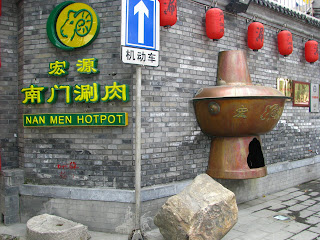My last stop in China was capital city, Beijing. This is not my first time in Beijing. I had done all the touristy stuff when I was here with my parents a few years back. I had no intention of doing the Great Wall, the Summer Palace or the Forbidden City etc a second time. Hence, I was not overly excited to be in Beijing. To me, this was just the starting point of my Trans-Mongolian (Trans-Siberia as most people know it) trip. Furthermore, it was less than two weeks before the start of 2008 Beijing Olympics, prices for everything was skyrocketing, so I’d made up my mind to get out of here the moment I secured my train ticket out of China.
可是老天一直跟我作对。因为是国际线,火车不是天天有,到达北京时是星期五,原本在考虑买星期六的票(下一班是星期二)。可是这里的怪系统是,火车站不售国际票,要到指定的旅行社买才有。好不容易从火车站走到旅行社,才被告知他们已经下班了。结果隔天去买票,就只能买星期二的票,这一来就得在北京待上好几天了。
As luck has it, I was not able to get out as quickly as I’d expected. The trains for Mongolia leave on Tuesdays and Saturdays. It was a Friday when I got into Beijing. I was counting on getting the ticket for Saturday. But the weird system here was that you could not get international train tickets at the main train station, but instead have to go to a specific travel agent. After finally locating the travel agency with quite a bit of walking, I was told that the office has closed for the day and I would have to go back the next day. So there I was, ending up with a ticket for the train that leaves on Tuesday and was “forced” to explore Beijing once, with five days to spare.
既然被迫在这里待那么多天,那就干脆去走走。先来个胡同游,之前来北京的时候没有什么游胡同,这次就慢慢地看个够。原来不只是古镇和古街被商业化,就连胡同也被商业化。什么酒吧啊、精品店啊、服装店啊等,都是冲着游客来。而这些店的名字很多都很特别,像什么“12平米-北京最小的酒吧”(真的就只有12平米大喔!)、“过客”和“16毫米”(指的是电影)等。虽然商业味道浓,但也有着老字号的店铺,像是这家卖奶酪的,每天都排着长龙。
I did not visit any hutong, the tiny old streets of old Beijing, the last time I was here. Thus, the first thing I did was to explore the hutongs. However, it seems that not only old streets and old towns are becoming touristy, even hutongs are being commercialized. From the décor, designs and even names of the many bars, pubs, restaurants and shops in the hutongs, you can see that it is the tourists that now breathe life to these hutongs. There are shops with names like “12sqm-the smallest bar in Beijing” (it really IS only 12square meters big!), “Pass by bar” and “16mm Bar”. And you also have shops with a long history like this yogurt shop here, which sees long queues every day.
I did not visit any hutong, the tiny old streets of old Beijing, the last time I was here. Thus, the first thing I did was to explore the hutongs. However, it seems that not only old streets and old towns are becoming touristy, even hutongs are being commercialized. From the décor, designs and even names of the many bars, pubs, restaurants and shops in the hutongs, you can see that it is the tourists that now breathe life to these hutongs. There are shops with names like “12sqm-the smallest bar in Beijing” (it really IS only 12square meters big!), “Pass by bar” and “16mm Bar”. And you also have shops with a long history like this yogurt shop here, which sees long queues every day.









 真正的胡同是不开放,而是让人们住的。你绝对不会误闯,因为从门外就可以看到当地人生活在胡同内的四合院的迹象。
真正的胡同是不开放,而是让人们住的。你绝对不会误闯,因为从门外就可以看到当地人生活在胡同内的四合院的迹象。Actually, the real hutongs are not meant for tourists, but is where the locals stay. Just by the bits of everyday life that you can find at the entrances to these hutongs, you will know that this is the real deal.

 另一个胡同的商业味道更浓,这里的建筑很多都被翻新过,没有翻新过的房子看起来破旧,根本就没有游客敢接近。这里最大的吸引力就是它附近的小河。很多乘客多选择小船或是三轮车来欣赏这里的风景。走累了,可以随便找个地方休息,有时会有额外的“余兴节目”,如看人家聚精会神地下棋等。
另一个胡同的商业味道更浓,这里的建筑很多都被翻新过,没有翻新过的房子看起来破旧,根本就没有游客敢接近。这里最大的吸引力就是它附近的小河。很多乘客多选择小船或是三轮车来欣赏这里的风景。走累了,可以随便找个地方休息,有时会有额外的“余兴节目”,如看人家聚精会神地下棋等。The other hutong was even touristier than the first one. Most of the buildings here are newly refurbished or renovated, with many of it hawking fares for the tourists. Those buildings that are left in their original states are always given a miss by the tourists. The biggest attraction here is the river nearby. Many tourists choose to enjoy the beauty of this place by boats or by tricycles.

















 离开了胡同,沿着小河一直走,就会来到另一个游客区。这里的感觉真的很像新加坡的驳船码头,尽是一些名气大的餐厅或酒吧,像是“全聚德”(就是那个卖北京烤鸭非常出名的店)。噢,还有星巴克呢。
离开了胡同,沿着小河一直走,就会来到另一个游客区。这里的感觉真的很像新加坡的驳船码头,尽是一些名气大的餐厅或酒吧,像是“全聚德”(就是那个卖北京烤鸭非常出名的店)。噢,还有星巴克呢。Leaving the hutong behind, you will come to another touristy area. This place really feels like Clark Quay, with many pubs and big restaurants lining the riverside, including “Quan Ju De”, that famous Peking duck restaurant. And oh, there is Starbucks too.











之后去王府井走了一圈。上次来的时候,对王府井附近一个小吃街印象深刻,这次又特地去看了一看。原来所卖的东西都变了,之前看到不少的昆虫小吃,这次什么虫都没有看到,只有冰糖葫芦、烤肉串和包子等正常的各地小吃。
Next up, was a walk down Beijing’s “Orchard Road”, i.e. Wangfujin. Actually, it is not the shops here that left me with a deep impression the last time I was here. Rather, it was a food street at the end of Wangfujin that made me remember this place. The last time round, I found all sorts of food being sold here, including worms and insects. This time round, there was nothing of these kinds to be found. It was all just normal delicacies that you can eat in different parts of China.





 既然奥运会开幕在即,当然要去参观一下奥运村啦。最棒的是,朋友Hairul是为奥运筹委会做事的,所以有个免费的导游带我参观奥运村。开幕典礼会场“鸟巢”和游泳与跳水赛场“水立方”写得多,照片也看得多,这次亲眼看到,真的感觉它们很壮观。可惜没有在晚上来参观,尤其是水立方,听说晚上灯亮起来的时候是很漂亮的。去了奥运村,也就结束了我这次的中国游。 伟
既然奥运会开幕在即,当然要去参观一下奥运村啦。最棒的是,朋友Hairul是为奥运筹委会做事的,所以有个免费的导游带我参观奥运村。开幕典礼会场“鸟巢”和游泳与跳水赛场“水立方”写得多,照片也看得多,这次亲眼看到,真的感觉它们很壮观。可惜没有在晚上来参观,尤其是水立方,听说晚上灯亮起来的时候是很漂亮的。去了奥运村,也就结束了我这次的中国游。 伟Since I was in Beijing so close to the Olympics, of course I had to make a trip to the Olympic Village to check out what the big hoo-ha is for the “Bird Nest” and “Water Cube”. My friend Hairul was working on the Olympics, so I got a free tour guide for the village. I must say, the main stadium and the swimming arena do look impressive. It’s a pity that I went there in the day time though. I was told the two buildings looked really nice at nights with all the lightings. With the conclusion of the Olympic Village tour, the China leg of my RTW trip also draws to a close. ~wei


3 comments:
Oh my God! Is that 炸star fish?? 不正常咯。。
有点好奇这 Sex and DA city 是搞什么生意的??
看到那hotpot店的照片,不知道为什么想起了“香肉”- 有尝吗??
yeah... it is fried star fish. didn't dare to try it though.
the sex and da city? it is actually a restaurant. wahaha...
至于肉嘛,我向来都不是很喜欢猪肉,所以没有尝,只有看。
Hello.. I meant “香肉”,不是猪肉。。
Post a Comment